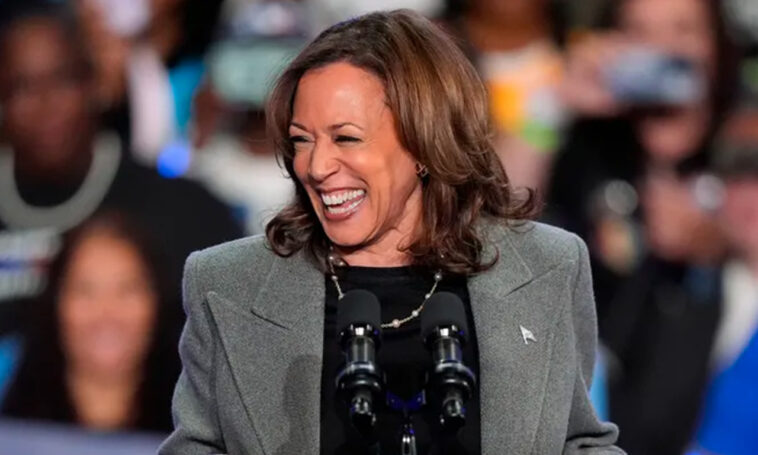A new ad by Kamala Harris’s campaign suggests Black men will be rejected by women if they don’t vote, sparking controversy.
Vice President Kamala Harris’s campaign has stirred controversy with a new digital advertisement aimed at Black men. The ad implies that these men risk rejection in their love lives if they do not plan to vote in the upcoming elections. Critics have called the approach “insulting” and “dehumanizing,” igniting a broader discussion about identity politics.
In the advertisement, a Black man approaches a group of women holding colorful balloons. The women begin asking him typical dating questions: his height, income, and fitness habits. Initially, the man receives positive responses. However, the mood shifts dramatically when one woman asks if he has a plan to vote in November. When he responds, “Nah, not my thing,” the women promptly pop their balloons, symbolizing their disinterest.
The closing message reads, “Vote. Election Day is Nov 5,” accompanied by the Harris-Walz campaign logo. The ad aims to encourage voter participation among young Black men, a demographic that historically supports Democratic candidates.
Former President Barack Obama has also weighed in on the situation. Speaking at a rally in Pennsylvania, he acknowledged a lack of enthusiasm among young Black men for the current campaign.
He stated, “Part of it makes me think – and I’m speaking to men directly – that you just aren’t feeling the idea of having a woman as president.”
Obama emphasized the need for engagement and urged this demographic not to sit out the election.
Critics quickly reacted to the advertisement. Richard Hanania, president of the Center for the Study of Partisanship and Ideology, shared the ad on X, commenting, “New Harris/Walz ad tells black men that women will reject them if they don’t vote. Memorable and works as an appeal to self-interest.”
While some viewed the ad as a clever way to motivate voters, others were less impressed. Many took to social media to express their discontent, arguing that the ad not only insulted Black men but also dehumanized them. One user wrote, “Democrats continue to dehumanize and insult black men and try to shame and pressure them into only voting for them.” Another added, “Does the Harris Walz team really believe this will convince anyone to vote for them?”
Such responses highlight a growing concern among voters. Critics argue that the ad oversimplifies the voting decision and reduces complex political choices to relationship status. One comment summarized the sentiment: “I think this might have the opposite effect.”
The controversy comes at a critical time for Harris as she seeks to energize support among young Black men. Polling data suggests some challenges in this area. A recent Howard University Initiative on Public Opinion poll indicated that while 81% of Black men plan to vote for Harris, that number drops to 68% among those under 50 years old. Alarmingly, 21% of younger Black men indicated they might support former President Trump instead.
Harris’s ad appears to be part of a broader strategy to regain support from young Black men. However, the backlash raises questions about whether such tactics will effectively resonate with this audience. Many believe that the campaign needs to adopt a more respectful and engaging approach, rather than relying on potentially patronizing messages.
The Harris campaign has yet to comment on the backlash regarding the advertisement. As Election Day approaches, the need for an inclusive dialogue and genuine outreach to voters becomes increasingly apparent.
This incident underscores a crucial aspect of political campaigning: the importance of understanding the audience. Targeting specific demographics requires sensitivity and an awareness of their concerns. If campaigns come off as insincere or disrespectful, they risk alienating the very voters they aim to engage.
The debate surrounding the ad also sheds light on broader issues in political messaging, especially regarding identity and representation. As the Democratic Party seeks to solidify support among diverse groups, it must navigate the complexities of their experiences and perspectives carefully.
As discussions continue about Harris’s ad and its implications, one thing is clear: the approach to reaching young Black men must evolve. Voter engagement is about more than just votes; it’s about respect, understanding, and genuine connection. As the election draws nearer, both the Harris campaign and Democratic leaders will need to reassess their strategies to ensure they foster a positive and inclusive environment for all voters.






Join the Community and Be a Part of the Conversation
You must be logged in or registered to post a comment.